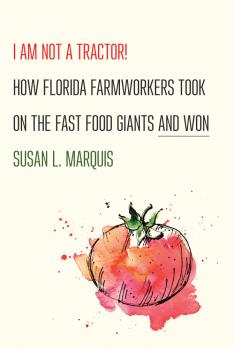
The book: Susan Marquis *95’s I am Not a Tractor: How Florida Took on the Fast Food Giants and Won (Cornell University Press) reveals how, until as late as 2011, immigrant tomato pickers in Florida were systematically exposed to toxic pesticides, beatings, sexual assault, wage theft, and modern slavery — but the story only begins there. Seeking to improve conditions, the laborers united to form the Coalition of Immokalee Workers (CIW) and they pioneered a program that — without the aid of government intervention — greatly improved living conditions for all East Coast farmworkers. They developed and implemented the Fair Food program, which received promises from major food distributors like McDonalds, WalMart, and Trader Joe’s to purchase only tomatoes from the 26 growers who had an agreement with CIW that provided improved conditions for workers. In only six years, the CIW movement has spread to other agricultural regions and its three founders were awarded a 2017 MacArthur Grant.
The author: Susan Marquis is the dean of the Pardee RAND Graduate School in Santa Monica, Calif., and the vice president of emerging policy research and methods for the RAND Corp. Marquis is also chair of the advisory council of the Woodrow Wilson School of Public and International Affairs, and a member of the board of directors of the Economics Of National Security Association and the Council on Foreign Relations. She also wrote Unconventional Warfare: Rebuilding U.S. Special Operations Forces (Brookings Institution Press).
Opening lines: “God, it was frustrating, but the two knew they were in the right place. When Greg Asbed and Laura Germino looked out the window of the small storefront office, they faced the cracked asphalt, broken concrete drivers, and courageous weeds that made up the Pantry Shelf parking lot. Throughout the day, the occasional beat-up Ford or rusted Chevy would pull in, seeking the shade of the grocery story wall. But most were walking. Woman, arms loaded with bags, walked out the market’s doors and down the streets patterned by the shade of the trees loaded with Spanish moss and the glaring sun of southwest Florida. Some carried fruit that reminded them of home in Haiti, but most were carrying the soda, chips, and other junk food that was the cheapest in the overpriced market.
The two paralegals, who made up two-thirds of Florida Rural Legal Services’ Immokalee operations, had to arrive early if they wanted to witness the reason for this unincorporated town’s existence. Immokalee was effectively a labor reserve for the big citrus, pepper, tomato, and other produce farms that filled the interior of the state. In the dark of predawn, a hundred or more (mostly) men shifted from one group to the next, clumped around the late-model pickups, the harshness of the headlights emphasizing the exhaustion on their faces. Men stood in the beds of the trucks or on the concrete dividers, shouting in Spanish and English, and indicating with a jerk of the head, a wave of the thumb, that the lucky souls could board the warn-out buses waiting there. If you didn’t get on the bus, you weren’t working that day.”
Reviews: “A scholarly study of an effort by Florida farmworkers to improve working conditions by building partnerships along the supply chain… [Marquis] does good service with this exploration of labor organization in the tomato fields of Florida.” — Barry Estabrook, author of Tomatoland

